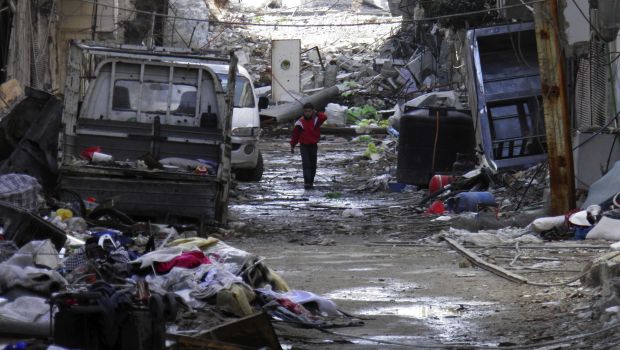
A boy walks along a street amid garbage and rubble of damaged buildings in the besieged area of Homs January 28, 2014 (REUTERS/Thaer Al Khalidiya)
The fifth day of talks focused on the transfer of power and helping besieged parts of Homs city. But there has been little progress toward resolving a key issue of whether President Bashar Assad should step aside and transfer power to a transitional government.
UN-Arab League mediator Lakhdar Brahimi broke off the morning session after the opposition rejected a paper presented by the official Syrian delegation denouncing the resumption of US aid.
“We believe this is not the best present to the Geneva conference,” said Faisal Miqdad, Syria’s deputy foreign minister, calling the American decision “another manifestation of US support for “terrorist groups” in Syria.
“This proves again that the United States is not interested in the success of this process, and we believe the US has to desist and stop its claims that it is interested in the success of this conference,” he told reporters following the meeting.
American officials said Monday the US has restarted deliveries of nonlethal aid to the Syrian opposition, more than a month after Al-Qaeda-linked militants seized warehouses and prompted a sudden cutoff of Western supplies to the rebels.
The officials said the communications equipment and other items are being funneled only to non-armed opposition groups, but the move boosts Syria’s beleaguered rebels, who saw their international support slide, in large part because of the extremists among their ranks.
“Any notion that we support terrorists is ludicrous. The Assad regime is a magnet for terrorists,” US State Department spokesman Edgar Vasquez said in a statement. “The regime’s brutality is the source of the violent extremism in Syria today. We support the moderate political and military opposition who are fighting for the freedom and dignity of all the Syrian people.”
Vasquez said the document the Syrian government offered “shows that the regime is evading the core purpose of the Geneva talks,” which is to reach a negotiated political solution for ending the war and suffering of Syrians.
Brahimi opened the morning session reviewing the principles of the Geneva Communique of June 2012, a broad but ambiguous proposal endorsed by Western powers and Russia to provide a basis for negotiations. Assad’s role in any transitional government was a red line during those negotiations and left vague. The US and Russia disagreed about Assad’s role, but they signed the communique.
By mid-afternoon, Murhaf Joueijati, a member of the opposition Syrian National Coalition’s negotiating team, told reporters the Geneva talks were breaking off for the day to give time for the government to make its proposal about the future of the country within the context of the 2012 accord.
On Monday, the government presented a working paper on Syria’s future, which Joueijati said the opposition rejected because it “had nothing to do with a transitional government.”
“We do not know what to expect tomorrow. They are going to try to change the subject yet again,” he predicted.
Assad’s family, from Syria’s Alawite minority, has ruled the country since 1970, pulling other religious minorities into its political orbit while rebellions by members of the Sunni majority were crushed.
Today’s civil war began as a peaceful uprising for freedom and rights in March 2011, but it has deepened the country’s sectarian divide and that could add to the difficulties of forming a transitional government.
Joueijati accused the government of holding up the delivery of aid to Homs, which has been under siege for nearly two years.
One complication in doing that and evacuating the city’s residents is that the opposition delegation does not control armed groups inside Syria, including Al-Qaeda-backed militants, who do not feel bound by agreements reached in Geneva. These groups gained control of Syria’s uprising as it evolved into an insurgency.
Miqdad, Syria’s deputy foreign minister, denied the government was delaying the delivery of aid, saying authorities were still waiting for “assurances that the aid will not go to armed and terrorist groups in the city.”
The focus on Homs and the release of detainees on both sides in Syria are meant as confidence-building measures. A tentative agreement was reached in Geneva last weekend for the evacuation of women and children trapped in Homs before aid convoys go in.
Homs Governor Talal Barrazi said police, paramedics and members of the Syrian Arab Red Crescent are ready to arrange the evacuation and “we are waiting for the UN’s response.” But Brahimi said security problems are delaying the evacuation.
Elisabeth Byrs, a spokeswoman for the World Food Program, told reporters that trucks are on standby to deliver food and help those who choose to be evacuated. But he added, “We need that all security conditions be met to allow this interagency convoy to go.”
Louay Safi, a negotiator for the opposition, said it proposed at Tuesday’s meeting lifting the siege by rebels of three towns and villages: the Shiite ones of Nubul and Zahra in Aleppo province and the Damascus suburb of Adra, which is mixed. Safi said the rebels had besieged them because they considered they were being used by government forces as a “launching pad” to attack Aleppo.
He said there has been no progress on Homs because of concerns the people who leave it would not have sufficient protection.
